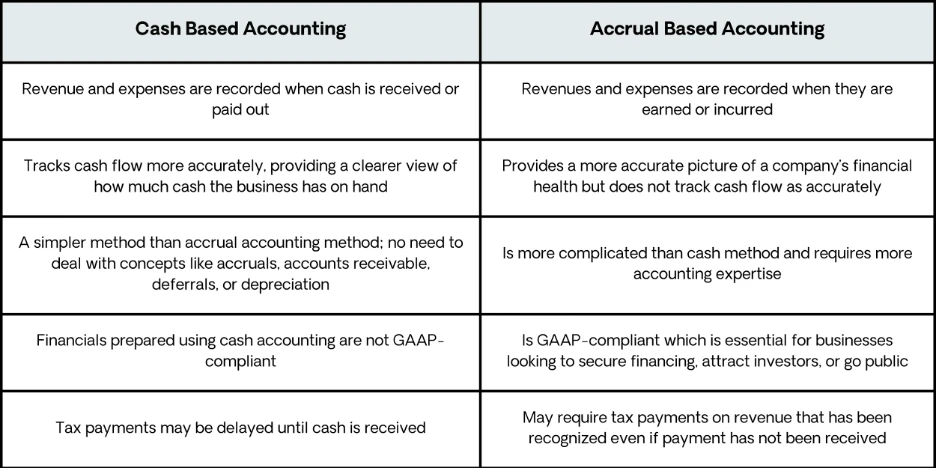Accurate Data in Accounting
Accurate data is essential for effective accounting, providing the foundation for informed decision-making and the long-term financial health of all companies. For marketing agencies, reliable financial records allow leaders to focus on clients and build their business with confidence. Agency leaders who know their financial data is strong have a foundation for an optimized strategy, ensuring compliance, and building stakeholder trust. In this article, we will explore the significance of data accuracy, common challenges, and best practices for ensuring data that is robust and can be relied upon.
The Significance of Accurate Data in Accounting
Accurate financial data is critical for a marketing agency’s performance and health because it directly impacts multiple facets of the business. Here are the key reasons why it is essential:
Financial Integrity: Precise data builds confidence in financial statements, allowing agencies to make sound business decisions regarding growth, hiring, and marketing efforts. It also provides financial institutions, which might provide funding or other financial assistance to marketing agencies, the comfort that your financial health is an integral part of your business. Inaccurate data can distort the true financial position, leading to poor decisions that harm profitability. For example, agencies with unreliable cash flow data may overspend or miss opportunities to invest in staffing or strategic acquisitions. Maintaining accurate financial records ensures transparency and reduces the risk of financial misrepresentation that can damage credibility.
Strategic Risk Mitigation: Agencies that operate with accurate financial insights can better assess potential risks, respond to market changes, and remain agile in competitive environments. For example, identifying discrepancies early allows marketing agencies to pivot quickly and avoid financial setbacks. Inaccurate data often leads to miscalculations and missed opportunities, which can severely harm a business.
Compliance with Regulations: Accurate financial data helps businesses adhere to financial laws and regulatory standards. Marketing agencies often navigate complex tax rules, especially when managing varying revenue streams, multiple vendors, and client contracts. Clear, accurate records ensure tax filings and audits are seamless, reducing the risks of fines or penalties. With accurate data, agencies can confidently demonstrate compliance during regulatory reviews and audits.
Benefits of Accurate Accounting Data for Your Marketing Agency

With accurate financial data, marketing agencies can stay agile, competitive, and well-prepared for both opportunities and challenges.
Enhanced Decision Making: Reliable financial data empowers agencies to make strategic decisions regarding client acquisition, retention, and resource allocation. With accurate data, agency leaders can review client profitability, assess campaign ROI, and allocate budgets effectively. Data-driven decisions support better forecasting, ensuring resources are focused on high-return activities and growth initiatives.
Agencies with precise data can also identify which clients or service lines are underperforming. For example, accurate profit margin analysis allows decision-makers to determine if pricing adjustments or cost-cutting measures are necessary.
Investor Trust and Confidence: Accurate records demonstrate transparency and accountability, building trust with investors and potential buyers. Agencies with reliable financial statements are better positioned for funding or acquisitions. Investors rely on financial transparency to gauge the health and stability of the business. Consistent, error-free records signal that an agency is well-managed and has a firm handle on its financial operations.
Budgeting Accuracy: Data precision is critical for accurate budgeting and forecasting. Accurate historical data provides the foundation for realistic financial planning. With clear records of past revenue and expenses, agencies can anticipate future expenses, allocate funds effectively, and avoid cash flow issues. Budgeting with inaccurate data often leads to overspending or underfunding key initiatives.
For instance, agencies that maintain accurate campaign expense data can allocate more accurate budgets for future projects, ensuring profitability without overextending resources.
Challenges in Achieving Data Accuracy
Achieving data accuracy can be challenging for marketing agencies due to several factors, including complex revenue models, manual data entry errors, misalignment of accounting methods, lack of integrated systems, inadequate staff training, technological challenges and volume of transactions, just to name a few.
Common Sources of Data Inaccuracies: Errors often stem from using the wrong accounting method. For marketing agencies, accrual accounting typically offers a clearer view of financial health than cash accounting. Accrual accounting records revenue and expenses when they are earned or incurred, providing a more accurate financial snapshot. Agencies that rely on cash accounting may overlook upcoming liabilities or overstate cash flow.
Manual data entry is another common source of inaccuracies. Agencies relying on spreadsheets or disconnected systems are more prone to human errors, such as duplicate entries or transposed numbers. Misaligned expense categorization can also distort financial reporting.
You can read more about this topic in our blog entitled cash-based vs. accrual based accounting.
Technological Advancements and Automation: While automation reduces manual errors, improper setup or insufficient training can lead to data inaccuracies. Agencies should implement proper systems with built-in validation rules, automated reconciliation, and data integration capabilities. Comprehensive training ensures accounting teams can guide business leaders to effectively use these systems to improve data accuracy.
Additionally, using integrated platforms that connect invoicing, project management, and expense tracking helps ensure consistent and synchronized data across all financial systems.
Best Practices for Ensuring Data Accuracy

By adhering to best practices, marketing agencies can significantly improve data accuracy, enhancing financial decision-making, compliance and overall business performance.
Robust Accounting Systems and Software: Modern accounting software tailored to agency needs reduces errors with automation, real-time tracking, and data validation. These systems can flag anomalies, provide alerts for missing information, and automate reconciliations. Agencies should use platforms that offer multi-level user access to reduce unauthorized changes and enhance data security.
Cloud-based systems also allow real-time collaboration, ensuring all stakeholders have access to the latest data. This transparency improves oversight and accountability.
Regular Audits and Reviews: Conducting regular financial reviews identifies discrepancies and ensures data remains accurate and up to date. Audits help catch errors early and prevent financial misstatements from snowballing into larger issues. Periodic reviews also help verify expense categorization and identify unusual transactions that may indicate fraud or errors.
Internal audits can be supplemented with external reviews for added objectivity and compliance assurance.
Training and Development for Accounting Personnel: Ongoing training helps teams stay updated on best practices. This includes training on accounting principles, software usage, and emerging industry regulations. Agencies should also evaluate whether in-house or outsourced accounting offers greater accuracy and cost efficiency. Outsourced providers have specialized expertise and dedicated resources to ensure accuracy.
You can read more about this in our blog entitled In-house Accounting vs. Outsourced Accounting: the Pros and Cons
Ensuring Data Accuracy for Long-Term Financial Health
Accurate accounting data is vital for marketing agencies looking to make strategic decisions, build trust, and create effective budgets. Prioritizing accuracy ensures better financial outcomes and business success. Tailored solutions and expert support are designed to provide agencies with peace of mind and actionable financial insights. We implement accounting systems and automation to fit your agency’s unique needs. By tailoring solutions, we ensure accuracy while streamlining financial processes. Our proactive approach helps agencies identify potential issues before they become major problems.
If you’re a marketing agency or professional services firm looking to scale, don’t hesitate to get in touch with the outsourced accounting experts at AURA for a complimentary consultation.
In-house Accounting vs. Outsourced Accounting: the Pros and Cons
A strong accounting infrastructure is crucial for the financial health of any business. Accurate, well-organized financial records give you a clear view of your company’s performance and the confidence to make strategic decisions that enable your company to scale. When it comes to ensuring the right accounting foundation is in place, business owners face a key choice: build an in-house accounting department or outsource your accounting functions. Each approach comes with unique advantages and challenges, and determining the best fit depends on a number of factors including your company’s size, industry, budget, and long-term growth objectives.
In this post, we’ll break down the pros and cons of an in-house versus an outsourced accounting solution so you can make an informed decision that aligns with your business strategy and long-term goals. Whether you’re seeking cost efficiency, specialized expertise, or more control over financial operations, we’ve got the insights to guide you to the decision that’s right for your business.
When is the Right Time to Hire an Accountant?
An accounting team has a wide range of important responsibilities within an organization. From overseeing your company’s financial systems and ensuring tax compliance to preparing financial statements, accounting is instrumental in developing, monitoring, and managing the company’s budgets and cash flow.
Generally, a business is ready for an accountant when their financial operations become more complex and require detailed reporting, analysis, and accurate, timely financial statements. A good accountant has in-depth knowledge of accounting standards, tax laws and regulations, and is proficient in accounting software and spreadsheets.
For detailed insights on the qualifications to look for in an accounting resource, check out our Comprehensive Guide for Businesses post which covers the different financial roles your company may need at various stages of its growth and how to choose the right expertise at the right time.
What is In-House Accounting?
In-house accounting involves hiring and training accountants to handle the company’s financial tasks, such as bookkeeping, generating financial statements, and tax preparation. In-house accounting is the traditional way of handling a company’s finances, where the accounting team is an integrated part of the organization rather than an external firm. By keeping accounting in-house, businesses can maintain direct control over their financial data and processes, ensuring that all financial operations align closely with the company’s specific needs and goals.
What Are the Pros of In-house Accounting?
Managing your accounting functions internally with dedicated staff has several advantages for businesses. Below are the biggest benefits to keeping your accounting in-house.
- Control & Oversight: By managing your accounting functions in house, you have full visibility and control over your company’s financial processes. This allows for real-time adjustments and close monitoring of your financial data.
- Tailored Processes: An in-house accounting department gives you more flexibility over your processes and procedures so that they can align with the specific needs of your business.
- Immediate Availability: An in-house accounting department means that you have a team readily available to answer questions, address urgent financial concerns, and collaborate directly with your leadership team and other departments.
- Cultural Alignment: Having your own accounting department means that your team members are more closely aligned with the company culture and strategic goals. This can result in better collaboration with other departments.
While in-house accounting offers control and oversight, it can also be expensive and require careful management. The financial implications of hiring full-time or part-time accountants, along with the potential quality variations and management challenges, need to be carefully considered.
What are the Cons of In-house Accounting?
Solely relying on in-house accountants can come with some drawbacks including the following:
- Limited Expertise: Smaller in-house accounting teams may lack the depth and specialization found in outsourced firms, potentially leading to gaps in knowledge. In addition, businesses that rely on a single in-house accounting resource can face delays and other issues if the employee is out of the office unexpectedly.
- Resource Constraints: During peak times like tax season or audits, in-house accounting staff may struggle with capacity, leading to potential burnout or errors.
- Technology Investments: Managing your accounting function in-house could mean that you need to invest heavily in accounting software and systems upgrades along with training and continuing education for your staff which could mean added expenses and loss of productivity.
- Higher Costs: The human resources side of an in-house team such as competitive salaries, benefits, training, turn-over, and overhead expenses can make an in-house accounting team significantly more expensive compared to outsourcing.
Now that you have an understanding of the advantages and disadvantages of having accounting in-house, let’s look at the benefits and drawbacks of outsourcing your accounting function to a third party.

What Does it Mean to Outsource Your Accounting?
Generally speaking, outsourced accounting means that you delegate all of your accounting responsibilities to a third party that handles all of the normal accounting services such as basic bookkeeping, financial reporting, payroll processing, accounts payable and accounts receivable, budgeting and forecasting, tax preparation, and regulatory compliance, among other functions.
Accounting services can be outsourced to an individual accountant or an outsourced accounting firm that offers all levels of support based on the business’s needs. Complete control of accounting tasks are handed off to the outsourced partner who bills an hourly rate or a fixed monthly fee or retainer depending on the scope and complexity of services provided.
Examples of Outsourced Accounting Services
Outsourced accounting services cover a broad range of services. Some examples of accounting services that can be handled by a third party include:
- Financial Statement Preparation: Creating accurate and timely financial statements to provide a clear picture of the company’s financial health.
- Budgeting and Forecasting: Developing budgets and financial forecasts to guide business planning and decision-making.
- Accounts Payable and Accounts Receivable Management: Handling the processing of invoices and payments, as well as managing incoming payments from customers.
- Payroll Processing: Managing employee payroll, including calculating wages, withholding taxes, and ensuring timely payments.
- Tax Preparation and Planning: Preparing and filing tax returns, as well as developing strategies to minimize tax liabilities.
- Financial Analysis and Reporting: Analyzing financial data to provide insights and recommendations for improving financial performance.
The Pros of Outsourcing Your Accounting Services
Outsourced accounting services provide businesses access to a broader pool of knowledge and expertise, and is especially beneficial to small and midsize companies that do not require and often can’t afford full time accounting experts.
Below are the primary benefits to outsourcing accounting services to a third party.
- Access to Expertise: With an outsourced solution, a business can access a wide range of specialists with deep knowledge in various areas of accounting, tax compliance, and financial strategy as well as expertise in cash based and accrual based accounting methods.
- Scalability: With an outsourced provider, businesses can increase services as they grow and pull back during slower times without the hassle of hiring or firing full time employees. Working with an outsourced accounting firm can also provide access to different levels of expertise from accountant to controller, to CFO services so that the partner can grow with the business.
- Focus on Core Business: Outsourcing accounting to an external firm frees up management time and resources so they can focus on strategic goals and core business functions, rather than dealing with time consuming accounting tasks.
- Latest Technology: Outsourced accounting providers often use advanced accounting software and stay up to date with industry trends, reducing the need for companies to invest in costly tech upgrades and training.
- Cost Savings: Outsourcing accounting services is typically more affordable than hiring in-house accountants, as businesses only pay for the services they need without the overhead of salaries, health insurance, holidays, sick time, or other overhead costs.
Now that we’ve covered some of the benefits of working with an outsourced accounting service provider, let’s take a look at some of the disadvantages.
The Cons of Outsourcing Accounting
Outsourced accounting has many benefits but may have some drawbacks when compared to an in house accountant. Among the biggest disadvantages are the following:
- Less Immediate Access: With an outsourced accounting process, communication and response times may not be as immediate as with an in-house team, particularly for urgent financial issues that may arise.
- Potential Security Concerns: Sharing sensitive financial information with an external provider may increase the risk of data breaches, requiring strict security protocols.
- Less Control: Businesses may have less oversight of their company’s finances and financial processes and may need to adjust to the outsourced accounting provider’s established workflows.
- Cultural Disconnect: External accounting firms may not have a thorough understanding of the business’s accounting needs nor align with the company’s culture, values, or specific business strategies.
- Dependency on Vendor: Relying on a third party firm means the business may be vulnerable to service disruptions if the provider experiences issues or if the relationship ends unexpectedly.
To mitigate these risks, businesses should:
- Establish Clear Communication Channels: Set up clear protocols for data sharing and communication to ensure transparency and accountability. Ideally you’ll have access to a team, not just one individual for better coverage and faster response times.
- Implement Robust Security Measures: Use encryption, access controls, and other security measures to protect sensitive financial data.
- Conduct Thorough Research: Investigate the outsourced accounting firm’s security measures and reputation to ensure they have robust protocols in place.
- Interview Multiple Providers: While overall reputation and experience are important, it’s equally important to find a partner that aligns well with your company culture and values. Speaking with three to five firms will ensure you find the right cultural fit.
- Regularly Review and Audit: Periodically review and audit the outsourced accounting firm’s work to ensure compliance with security standards and accuracy.
Is Outsourced Accounting Right for Your Business?
While outsourcing comes with some challenges, partnering with an external accounting expert is often a smart move for growing companies. Rapid growth, for instance, often comes with increased financial complexity and requires more advanced financial management than an in-house accounting team can provide. Businesses also turn to outsourced accounting expertise when navigating complex financial decisions or regulatory hurdles, where specialized knowledge is essential. Additionally, companies with seasonal fluctuations or unpredictable workloads benefit tremendously from outsourcing, as service levels can be scaled up or down as needed—something a single in-house accountant or team simply can’t offer.
Choosing the Right Outsourced Accounting Partner
Once you’ve decided that outsourcing is the right decision for your business, selecting a partner that can provide reliable and timely services tailored to meet your specific business requirements is crucial. Below are some key considerations to aid your search.
- Expertise & Specialization: Ensure that the outsourced accounting firm has experience working with businesses of your size and industry and can provide insights and recommendations that support your strategic goals.
- References & Reputation: Research the provider’s track record, read reviews, and ask for client references to gauge their reliability, service quality, and responsiveness.
- Technology & Tools: Make sure the accounting firm uses modern, secure accounting software that integrates well with your existing systems and offers real-time access to financial data.
- Communication & Availability: Assess how the firm communicates and how accessible they are. You’ll want a partner who is responsive and offers multiple layers of support and clear lines of communication.
- Pricing & Service Flexibility: Understand the firm’s pricing structure and make sure it’s transparent and aligns with your budget. Look for flexibility in services so you can scale up or down as your business evolves. And remember, price should not be the main determining factor.
- Alignment with Company Values: As mentioned above, it’s important to choose a partner who understands your company’s culture and goals, and who will act as a strategic ally in supporting your long-term vision.
Key Takeaways
Deciding whether to hire in-house staff or outsource to a professional accounting firm is a significant decision that requires careful consideration. We hope this article has shed light on the advantages and disadvantages of in-house vs. outsourced accounting, helping you make an informed decision that best supports your company’s financial health and growth.
Partnering with AURA means tapping into a powerhouse team of accounting professionals, fractional controllers, and CFOs dedicated to supporting your business at every stage of growth. With a deep specialization in the marketing and communications industry, we understand how to streamline your operations, deliver precise and timely financials, and position your marketing agency to seize new growth opportunities.
If you’re a marketing agency looking to scale, please reach out to the outsourced accounting experts at AURA for a complimentary consultation.
Cash Based vs Accrual Based Accounting: Which is Right for Your Business?
Most entrepreneurs and business owners are visionaries and strategic thinkers who thrive on creativity and grand ideas, and not so much on data or numbers. They often prefer big-picture thinking over the nitty-gritty details, which is why many business owners find the financial side of running a business—like bookkeeping and accounting—challenging and unappealing. However, the financial side of the business is just as important as the creative side of running a business. Outsourcing these tasks to an accounting expert can free you from the day-to-day financial details, allowing you to focus on what you do best: growing your business.
An experienced accounting partner can manage your finances and craft a financial strategy tailored specifically to your business needs. This includes advising on key decisions like choosing the right software for your business and recommending the appropriate accounting method to ensure that your business’s financial practices align with your strategic goals.
In this article, we’ll break down the differences between the two methods of accounting – cash accounting and accrual accounting – to help you determine the best approach for your business.
What is Cash Basis Accounting?
Cash based accounting or cash accounting is a simple method of accounting in which revenue or expense transactions are recorded when cash is received or paid out, not when the revenue is earned or the expense is incurred.
This method of accounting focuses on cash flow, with a particular emphasis on cash on hand. This method is most often used by small businesses and for personal finances that don’t have a lot of complexity.
What Types of Businesses are Ideal for Cash Accounting?
The cash basis accounting method works well for businesses that don’t carry inventory, don’t buy or sell on credit, and for businesses that are paid relatively quickly after products or services are delivered.
Smaller businesses including sole proprietorships prefer cash accounting over accrual accounting. Some examples of businesses that are well suited for cash-based accounting include restaurants, retail stores, personal service businesses like hair salons, nail shops, and similar businesses.
What is Accrual Basis Accounting?
In contrast, the accrual method of accounting is more complex than cash accounting. The accrual accounting method records revenues and expenses when they are earned or incurred, regardless of when cash is actually received or expenses are actually paid. It is also known as accrual basis accounting or the accrual method. Accrual-based accounting provides a more accurate financial representation of a company’s operations by recognizing revenues and expenses as they occur and not when the cash is received or paid out.
Accrual accounting utilizes accounts payable and accounts receivable to formulate an accurate, real-time picture of a company’s financial status. Using this method generally evens out the income and expenses earned and incurred by a company and minimizes large swings created when cash exchanges hands.
What Types of Businesses are Well-suited for Accrual Accounting?
The accrual accounting method works well for medium to larger sized businesses and those that have delays between receiving cash and paying bills, accept or make credit card payments, or hold inventory are ideal candidates for accrual accounting.
Furthermore, businesses that have more than $25 million in sales over three years are required by the IRS to use accrual accounting. In addition, publicly traded businesses that are required to file audited financial statements must follow Generally Accepted Accounting Principles (GAAP) in recording and reporting their finances. GAAP sets the standard accounting rules for preparing, presenting, and reporting financial statements in the U.S. and its goal is to ensure that a company’s financial statements are complete, consistent, and conforms to an accepted set of standard accounting practices.
Many non-publicly traded companies utilize the accrual-based accounting method because it gives businesses a more accurate financial picture. This accounting method is regarded as more sophisticated than the cash method and is favored by lenders and creditors, so if the business ever needs a loan or line of credit, an accrual accounting method will increase the chances for approval.

Advantages and Disadvantages of Cash vs. Accrual Accounting Methods
There are clear advantages and disadvantages of cash basis and accrual basis accounting, and while accrual basis accounting offers most businesses a better glimpse into their overall financial health and conforms to generally accepted accounting principles, it does come with more complexity than the cash method of accounting.
The Pros and Cons of the Cash Basis Method
One of the biggest advantages of cash accounting is that it’s a much simpler method than the accrual method, and easier to manage for a business owner. Below are the biggest advantages and disadvantages to cash accounting:
Advantages:
- Simplicity: Cash basis accounting is notably simpler than the accrual method, making it easier for small business owners to implement and manage. This method directly tracks cash flow, providing a clear and immediate understanding of how much cash is available.
- Immediate Financial Overview: With transactions recorded when cash changes hands, business owners have an instant snapshot of financial activity, which simplifies the management of incoming and outgoing cash.
Disadvantages:
- Limited Financial Insight: One significant drawback is that cash basis accounting offers a narrow view of long-term financial health. It does not match revenue with the expenses incurred to generate that revenue, which can lead to misleading profit figures during periods of significant cash inflows or outflows.
- Difficulty in Long-Term Planning: Without the ability to foresee or plan for future incomes and expenses, cash basis accounting can make it challenging to perform effective business planning or forecasting. This approach also makes it difficult to measure profitability by client or project and productivity by staffing resources.
- Lacks Comprehensive Financial Controls: Unlike accrual accounting, cash basis accounting does not account for receivables, payables, and other important financial metrics like depreciation and amortization. This may necessitate additional procedures to manage credit effectively.
- Non-Compliance with GAAP: Financial statements prepared under cash basis accounting do not comply with Generally Accepted Accounting Principles (GAAP), which can be a significant drawback when seeking external financing or engaging with investors, as most prefer GAAP-compliant reporting.
As your business matures and your financials become more complex, you can switch from cash to accrual accounting, but because the transition can be tricky, it’s advisable to lean on an accounting expert like AURA.
The Pros and Cons of the Accrual Basis Method
There are many advantages to using the accrual method including gaining a more accurate financial picture. However, it comes with some complexity. Below is a quick summary:
Advantages:
- Enhanced Accuracy: The accrual method provides a more comprehensive financial picture by aligning income with the expenses incurred to generate that income, regardless of when cash transactions occur. This alignment helps businesses match revenues with expenses, leading to smoother financial statements and more predictable cash flow patterns.
- Improved Financial Planning: By recording transactions when they are earned or incurred, accrual accounting makes forecasting and budgeting more straightforward. This is particularly advantageous for businesses engaged in project-based work, where tracking time, expenses, and profitability by client and project is crucial.
- GAAP Compliance: Accrual accounting meets Generally Accepted Accounting Principles (GAAP) standards, making it necessary for businesses that seek financing, attract investors, or are preparing for an IPO.
Disadvantages:
- Complexity: Accrual accounting is more complex than cash basis accounting. It requires a thorough understanding of accounting principles and may demand more resources to manage effectively.
- Cash Flow Tracking: While accrual accounting offers a clear view of profitability, it can complicate the direct tracking of cash flow, as revenues recorded may not immediately correspond to cash received. Nevertheless, with accurate accounting records prepared by an organization like AURA, using accounts receivable and accounts payable records, companies can easily project their cash flow on a regular basis.
- May Be Overly Complex for Some: For small businesses that operate primarily on a cash basis without credit transactions, the benefits of accrual accounting may not justify its complexity.
Businesses that rely solely on cash payments may find accrual accounting unnecessary, as it is more beneficial for those extending credit, billing on an irregular cycle, or dealing with payment delays.
Below is a comparison chart that shows the primary differences between the two accounting methods.

Tax Implications of Cash and Accrual Accounting
Before deciding on the accounting and financial reporting method to implement for your business, it’s important to understand the tax implications of each of these accounting strategies.
Cash basis accounting may delay tax payments until cash is received while accrual accounting may require tax payments on revenue that has been recognized, even though the company has not yet received the cash for some of those transactions.
Examples of Cash Basis Accounting Method
Scenario 1: A wholesale business sells $5,000 worth of products in March, but doesn’t receive payment from the buyer until April.
Cash-Based Accounting: In this method, the transaction is recorded when cash actually changes hands. So, despite making the sale in March, the revenue is not recorded until April when the payment is received.
Scenario 2: A company pays $1,200 in advance for a year’s worth of insurance coverage in January.
Cash-Based Accounting: In cash-based accounting, the full $1,200 payment is recorded as an expense in January, the month when the payment is made. There is no recognition of prepaid expenses or allocation over the period the service covers, which impacts their cash flow in January.
Examples of Accrual Basis Accounting Method
Scenario 1: The same wholesale business sells $5,000 worth of products in March and issues an invoice, but doesn’t receive payment from the buyer until April.
Accrual-Based Accounting: Under this method, revenues and expenses are recorded when they are earned or incurred, regardless of when the cash is received or paid. Therefore, the $5,000 sale is recorded in March when the sale actually occurs, not in April when the payment is received.
Scenario 2: The same company pays $1,200 in advance for a year’s worth of insurance coverage in January.
Accrual-Based Accounting: Under accrual-based accounting, the $1,200 payment is recognized as a prepaid asset initially. Each month, $100 of this prepaid amount is expensed to reflect the insurance coverage for that month. Therefore, the expense is spread evenly over 12 months, recognizing $100 each month as the actual expense.
These scenarios further demonstrate how the timing of expense recognition can differ significantly between the two methods, affecting how financial statements reflect the company’s financial position and operations.
Choosing the Right Accounting Method for Your Business
As illustrated, several key factors influence whether cash or accrual accounting is the better method for your business. Gaining a clear understanding of these differences is crucial for business owners to make well-informed decisions regarding their accounting practices. This knowledge ensures that the selected method aligns with your business’s financial goals, reporting requirements, and operational needs.
If you’d like to discuss these two options in greater detail with a team of experts, contact AURA for a complimentary discussion. We can also help you transition smoothly from cash basis accounting to accrual basis accounting. We’re just a call or click away.
Accounting for Marketing Agencies: A Primer
If you’re in the advertising, creative, or branding industry, you’re focused on crafting strong, cohesive brand identities that drive client growth. But as an agency owner, are you giving the same attention to building a thriving, scalable enterprise of your own? Understanding and managing your agency’s financial health is a crucial first step.
This primer explores why good accounting and proper financial management are vital for marketing agencies, helping streamline operations, improve profit margins, and support informed decisions. We’ll also cover unique marketing industry challenges and how sound accounting practices can drive sustainable growth and success.
Why Good Accounting for Marketing Agencies is Critical

Establishing good accounting practices and proper financial management for your marketing agency enables real-time visibility into your organization’s financial well-being, which is critical as your agency grows.
Below are some of the top reasons why good accounting for marketing agencies is important.
Scalability and Growth
Scaling a marketing agency while enhancing profitability demands a thorough understanding of the agency’s financial landscape at both client and project levels. A robust accounting framework provides real-time access to financial reports and key performance indicators, enabling agencies to assess profitability at a granular level. This insight allows you to focus on high-performing areas while reducing investments in less profitable ones.
A clear understanding of your agency’s financial position and profitability empowers you to allocate cash and resources strategically. By setting aside funds to build a financial runway, you strengthen your financial stability, create a buffer to weather lean periods, and ensure you have the capital ready to invest in new opportunities. Good accounting supports informed decision-making, identifies improvement areas, and prevents costly errors.
Financial Stability and Cash Flow Management

Financial stability relies on an efficient accounting system that facilitates timely invoicing and consistent follow-up on overdue or missed payments, minimizing the risk of lost revenue. For most agencies, project-based work is a significant portion of their billings, so it’s critical that the invoicing process aligns with the payment terms specified in each client contract.
Timely payments to service providers, consultants, and freelancers is also important for agencies to keep their financial records up to date and avoid disruptions in service delivery.
Client Trust and Transparency

A well-oiled accounting machine fosters trust and loyalty with clients. Providing clear, accurate, and timely invoices helps clients maintain their own financial records and supports their efforts to achieve an accurate picture of their financial health. No business wants to be surprised by an invoice 60 days after a marketing campaign ran.
Maintaining a consistent invoicing process helps avoid unpleasant surprises and enhances the marketing agency’s trust and professionalism with their clients, fostering trust, confidence, and long-term relationships.
Risk Management
A solid accounting infrastructure includes internal controls to ensure that the marketing agency is compliant with financial regulations and tax laws, reducing the risk of legal issues that could impact an agency’s brand reputation.
Equally important is establishing automated systems and internal controls to prevent fraud and minimize errors. This includes setting up checks and balances that make it difficult for any one individual to commit fraud. Conducting regular audits to help detect unusual transactions or discrepancies can help flag issues before they happen so agencies can stay ahead of potential pitfalls and ensure long-term growth and viability.
Business Valuation
If your exit strategy involves selling your business or if you are in need of a credit facility with a financial institution, it’s important to maintain accurate and up-to-date financial statements, including balance sheets, income statements, and cash flow statements. These documents provide a clear view of your company’s assets, liabilities, revenues, and profitability—key factors that help drive the overall valuation of your business. Inaccurate accounting can distort these figures, leading to an undervaluation or overvaluation of your business, both of which can have serious consequences.
Accurate financials and strong accounting practices instill confidence in the valuation figures, paving the way for smoother negotiations and ultimately, better outcomes for you as the business owner.
Unique Accounting Challenges Faced by Marketing Agencies

Now that we’ve established the importance of good accounting practices for marketing agencies, let’s address some of the unique accounting challenges that marketing firms face.
Businesses that engage with clients on a project basis have an added layer of complexity to financial management than traditional retainer fee based businesses, which requires careful tracking and coordination to ensure accurate revenue recognition.
Cash Flow Uncertainty
Project-based billing typically involves defining key milestones and payment triggers in the scope of work agreement. Usually, there’s an upfront deposit, payments at certain milestones, and a final payment at project completion. Since milestones are reached at varying intervals and delays are common, payments are often unpredictable. This creates significant payment gaps and income uncertainty for owners, especially on large projects that span weeks or months.
Furthermore, revenue recognition generally follows milestones in the life cycle of the projects delivered to clients. Recording your revenue properly with an accrual-based accounting system is critical to understand your true revenue and profitability as earned as opposed to on a cash flow basis.
A fine-tuned billing process, accurate cash flow forecasting, and robust financial runway can help reduce financial stress during periods of payment uncertainty.
Full-time Employees versus Freelancers and Consultants
Allocation between full-time employees (FTEs) and freelancers or consultants presents unique challenges and risks for agencies. FTEs offer consistency, deeper brand knowledge, and long-term commitment, but have higher overhead costs, including benefits, payroll taxes, and the risk of underutilization during slow periods. On the other hand, freelancers and consultants provide flexibility and specialized skills on an as-needed basis, reducing fixed costs and allowing agencies to scale quickly. However, reliance on external talent can lead to challenges in maintaining consistent quality, brand alignment, resource availability, and their base cost is often higher.
Having visibility into staff utilization by client and project and performance by individuals are key to finding the optimal workforce balance for your agency. To access this level of insight, it’s important that agencies have a solid method for tracking time and cost as discussed in the next section.
Time Tracking and Cost Allocations

To accurately measure profitability by project and client, agency owners must meticulously track time and expenses, including charges for travel, client meals, incidentals, and digital marketing campaigns. Linking all client-related costs and hours worked is essential to understanding FTE utilization and service provider productivity, enabling a clear picture of where adjustments are needed. Proper financial management supports informed decision-making, identifies improvement areas, and prevents costly errors.
While many agencies have internal systems for tracking time and resources, tools like Harvest, Toggle, Teamwork, and Clockify can enhance this process. It’s crucial for agency owners to have granular visibility into high and low performing areas at both client and project levels to know where to focus efforts and what to trim.
Client Billing and Project Billing Challenges
Proper financial management, including an automated billing system and implementation of accounting software, is essential for generating invoices on time and following up on outstanding receivables, especially if clients are on different payment schedules. An automated system also minimizes errors and payment delays often seen in manual processes.
It’s always best to research the options available, but some professional accounting software options include QuickBooks Online, Xero, and FreshBooks.
Client Dependence and Project Diversity
High client or project concentration poses significant risks to marketing firms. Agency owners must carefully evaluate the potential dangers of taking on large projects, especially considering how delays or cancellations could impact income and staff utilization. Losing a client that drives a large percentage of revenue will put significant strain on your business if that client departs with no warning. Proper financial management can help mitigate these risks by providing insights into the agency’s financial health and managing accounts receivable effectively.
How Agencies Can Get Ahead of the Challenges
Effective financial management and a solid accounting infrastructure, including timely, accurate financial reporting, automated accounting, and visibility into client and project profitability, are crucial for marketing firms’ long-term stability and profitability.
Strong risk assessment, internal controls, and financial planning safeguard operations against disruptions, enabling agencies to navigate challenges and seize new opportunities effectively.
Outsourced Accounting for Marketing Agencies

AURA specializes in providing outsourced accounting services that address the unique needs of marketing agencies and similar companies that engage in project work. We offer expert financial management that enables agency owners to focus on growth.
Comprehensive and Customized Accounting Services for Marketing Agencies
AURA’s comprehensive services include automated financial processes, accurate financial forecasting, monthly reports, profit margin analysis, and compliance with financial and tax regulations. We also implement internal controls to prevent fraud and errors, ensuring financial stability and growth readiness.
With deep marketing industry experience, AURA delivers tailored solutions by thoroughly understanding our client’s unique needs and objectives, ensuring seamless integration into their workflow.
Customization, communication, and collaboration are the cornerstones of our approach, and just a few of the many reasons our customers love us and stay with us for many years.
Conclusion
Good accounting is the backbone of your agency’s success. A partnership with AURA can give your company access to industry expertise, financial strategy and insights, and help your marketing firm increase profitability and confidently seize new opportunities.
Contact AURA today for a complimentary consultation and discover how we can customize a solution to help your marketing agency scale effectively.
Bookkeeper vs Accountant vs Controller vs CFO: A Comprehensive Guide for Businesses
For founders, owners, and CEOs, managing their company’s finances effectively is crucial for long-term sustainability and growth. Yet many executives are confused about the different financial roles and the necessary financial oversight needed for each stage of a business’s lifecycle.
This article breaks down the different accounting roles that a company owner may need along with some insights on the ideal time to hire a bookkeeper vs. an accountant vs. a controller, or a CFO.
The Role of a Bookkeeper: Day to Day Financial Record-keeping
A bookkeeper manages and records the company’s financial transactions, ensuring accurate and up-to-date monthly financials through meticulous transaction recording. While the bookkeeping needs of each business may differ, there are some common tasks that most bookkeepers perform.
Key responsibilities typically handled by bookkeepers include the following:
- Recording Transactions: Bookkeepers are responsible for day-to-day financial records and data entry, logging transactions such as sales, purchases, receipts, and payments. Organized records are typically updated in the company’s general ledger.
- Reconciling Accounts: Bookkeepers regularly reconcile bank statements and ensure that the company’s financial information and transactions are accurate and up-to-date including accounts receivable and accounts payable.
- Processing Payroll: Another common task handled by a bookkeeper is calculating and processing employee paychecks and payroll, ensuring timely and accurate payments along with necessary tax withholdings.
When Should You Hire a Bookkeeper?
There are some common triggers that indicate that a business is ready to bring on a bookkeeper. Here are some signs that it may be time to hire a bookkeeper.
- Your Company is in the Start-Up Phase: Bookkeepers are ideal for smaller companies and start-ups looking for some help early on to handle daily financial tasks and keep records well-organized from the beginning.
- You Have Basic Financial Needs: If a company needs help with basic tasks like data entry, paying invoices, tracking expenses, handling accounts receivable and accounts payable, and reconciling bank statements, bookkeepers can help.
- You’re Experiencing Increasing Transactions: When the volume of transactions increases and becomes too time-consuming for you to manage, or more errors show up in the books, it may be time to offload these responsibilities to a bookkeeper.
- You Can’t Keep Up with the Latest Accounting Software: Bookkeepers can manage and upkeep the accounting software you use to manage your transactions. Many are experts in accounting software like QuickBooks, Sage, or Xero.
Hiring a bookkeeper to handle these tasks can provide peace of mind, improve financial accuracy, and allow you to focus on increasing your revenue and meeting your corporate objectives.

When hiring a bookkeeper, you should consider several qualifications and credentials to ensure you find a competent and reliable bookkeeping professional. Here are some key factors to look for:
- Basic Accounting Knowledge: Understanding fundamental accounting principles and concepts are important for the bookkeeper to maintain accurate financial records for your business.
- Proficiency with Bookkeeping Software: Familiarity with accounting software such as QuickBooks, Xero, or FreshBooks to efficiently manage your financial data is critical.
- Professional Certifications: There are several certifications that bookkeepers can attain such as the American Institute of Professional Bookkeepers (AIPB) which demonstrates competence in bookkeeping and adherence to industry standards. The Certified Public Bookkeeper (CPB) is provided by the National Association of Certified Public Bookkeepers (NACPB) and validates the bookkeeper’s skills and knowledge. In addition, certification for accounting software like QuickBooks, Xero, Sage, or FreshBooks is also available and a huge plus.
By considering these qualifications and credentials when looking to hire a bookkeeper, business owners can feel confident that their company’s accounting function will be handled in a professional manner.
An Accountant’s Primary Role: Financial Data Analysis and Reporting
Where a bookkeeper adds a lot of value in transactional work like paying bills, processing invoices, and payroll processing, an accountant’s role encompasses a wide range of responsibilities, from overseeing your company’s accounting system to ensuring your business is fully compliant with its tax and reporting obligations, to helping you determine whether a cash-based accounting or accrual-based accounting method makes more sense for your business.
Below are the four main areas that an accountant typically handles for their clients:
- Preparing Financial Statements: Accountants prepare detailed financial statements such as income statements, balance sheets, and cash flow statements to provide a clear picture of a company’s financial health.
- Tax Preparation and Filing: Accountants prepare quarterly and annual tax returns, ensure compliance with tax laws, and develop tax strategies to minimize their clients’ liabilities.
- Conducting Audits: Accountants perform internal audits to ensure accuracy and compliance with financial regulations and accounting standards.
- Budgeting and Forecasting: Accountants develop and monitor budgets, manage cash flow, determine the best accounting method (cash or accrual), and provide financial forecasts to guide strategic business decisions.
When to Hire an Accountant
So how do you know when your business is ready for an accountant? It depends on the specific needs of your business, the complexity, and stage of growth, but here are some key indicators that your business may be ready for a financial accounting expert.
- You Have Complex Financial Needs: As your company grows, financial operations become more complex, requiring detailed analysis and reporting to make informed financial decisions.
- You Need Tax Preparation and Planning: Your accountant will handle your corporate tax preparation and filing and will ensure compliance with evolving tax laws.
- Accurate Financial Statements Become More Important: Your accountant can prepare accurate monthly financial statements such as income statements, balance sheets, and cash flow statements for stakeholders, investors, or lenders.
- Your Business is Experiencing Growth: If your business is growing and financial operations have become more complex, an accountant will assist with budgeting, forecasting, and financial planning to support your growth and strategic objectives.
- You’re Concerned with Regulatory Compliance: An important function of an accountant is ensuring your business is compliant with accounting standards (GAAP or IFRS) and other regulatory requirements, as well as preparing for and handling audits, either internal or external.
Undoubtedly, accountants play a critical role in a company’s financial stability and health as well as ensure compliance with tax regulations. By providing insightful analysis and strategic advice, accountants can help businesses achieve their financial goals and navigate complex financial landscapes.

When deciding to hire an accountant, there are several qualifications that are essential to consider.
- In-Depth Knowledge of Accounting Standards: Familiarity with GAAP (Generally Accepted Accounting Principles) or IFRS (International Financial Reporting Standards) is important to ensure your accountant understands financial reporting standards.
- Tax Expertise: A seasoned accountant should have a good understanding of tax laws and regulations to prepare accurate tax returns and develop effective tax strategies.
- Proficiency in Accounting Software and Spreadsheets: Advanced skills in accounting software (e.g., QuickBooks, SAP, Oracle) and spreadsheet programs (e.g., Excel) for analysis and reporting are critical skills for an accountant.
- Accounting Certifications: There are many types of certifications for accountants, even specialized certifications for specialties like auditing, financial services, or forensics. The most popular accounting certification is a CPA license which is granted by the American Institute of Certified Public Accountants (AICPA) and validates the accountant’s expertise in tax, compliance, risk management, and other areas. The CMA or Certified Management Accountant credential, provided by the Institute of Management Accountants (IMA) is a global certification that demonstrates an accountant’s expertise in accounting, financial planning, and financial analysis.
Hiring the right accounting partner is an important decision for any business. Finding someone that you like and trust is just as important as finding an accountant that has the credentials and experience.
A Controller’s Primary Function: Financial Management and Controls
A controller oversees the entire accounting function within a business and ensures the accuracy and integrity of financial data. A controller helps the business maintain its financial well-being and supports its long-term growth objectives.
Below are a controller’s key areas of focus:
- Implementing and Maintaining Internal Controls: A controller develops and implements internal controls to safeguard the company’s assets and ensure accuracy in the company financials.
- Supervising Accounting Staff: Controllers typically oversee the accounting department, ensuring efficient and accurate financial operations and management.
- Overall Financial Governance: The controller is responsible for the financial reporting and fiscal health of the company. They ensure that financial statements are prepared accurately and in a timely manner and provide insights into the company’s financial performance.
- Managing Budgets and Financial Forecasts: Controllers develop and manage budgets and financial forecasts, helping to plan for the company’s future financial needs.
When to Hire a Controller for Your Business
A business typically needs to hire a controller when it reaches a level of complexity and growth that requires more sophistication and experience than the average accountant can offer.
Key indicators that it’s time to hire a controller include:
- Business Growth and Expansion: If your business is expanding to new locations, launching a new product, or exploring new markets, a controller can help ensure you’re prepared from a reporting standpoint.
- Establishing Controls: As your company grows, it becomes necessary to establish strong internal controls and financial processes to prevent or minimize fraud and to ensure that your financial reports continue to be timely and accurate.
- Strategic Financial Planning: As the number of transactions and complexity grow, a controller can provide an added layer of expertise to develop a comprehensive budget and forecast model and financial process to support long-term planning and resource allocation.
Once you’ve made the decision to hire a controller, it’s important to review the qualifications that are necessary to ensure the right fit for your business.
A controller’s industry experience and overall familiarity with the nuances of your business are important as are the following skills:
- Leadership and Management: Experience in leading an accounting team and overseeing financial operations are critical skills in a controller.
- Advanced Accounting Knowledge: A deep understanding of complex accounting practices, financial analysis, and reporting are required skills for a controller.
- Proficiency in Financial Software: A controller should have advanced skills in financial software systems and ERP (Enterprise Resource Planning) software.
- Internal Controls Expertise: Knowledge of creating and maintaining robust internal controls to safeguard assets and ensure accuracy and timely reporting of the company’s financials is a critical skill needed in a controller.
- Certifications for Controllers: There are a variety of certifications that a controller can attain. Many controllers are certified public accountants or Certified Management Accountants (CMA) which focuses on management accounting and financial skills, including budgeting, forecasting, and strategic planning. A Certified Internal Auditor (CIA) designation is valuable for controllers responsible for internal controls and auditing.
A Chief Financial Officer’s (CFO’s) Role: Strategic Financial Leadership
Chief Financial Officers oversee the entire finance department and act as a key advisor to the CEO and executive team, helping to shape the company’s overall strategy and ensuring that financial resources are effectively allocated to support the company’s objectives.
Below are the primary responsibilities of a CFO:
- Strategic Planning and Financial Goal-setting: The Chief Financial Officer is a senior executive responsible for the strategic financial direction of the company. The CFO develops and executes financial strategies to support the company’s growth objectives.
- Risk Management: A CFO assesses the financial risks and opportunities of the organization and develops strategies to mitigate risks and capitalize on opportunities.
- Managing Investor Relations: CFOs handle relationships with investors, communicate with stakeholders, assist in raising capital, assess the organization’s investments, and communicate financial performance and strategy.
- Overseeing Mergers and Acquisitions: CFOs lead the financial aspects of mergers, acquisitions, and other significant business transactions.
- Leading Financial Planning and Analysis: CFOs conduct comprehensive financial planning and analysis to guide strategic decisions and ensure the company’s financial stability and growth.
When to Hire a Chief Financial Officer
As your company continues to grow and the financial needs of the company outgrow the skill set provided by your controller, hiring a CFO, whether part-time or full-time is the next logical step.
Below are some areas that CFOs typically oversee:
- Strategic Growth: When your organization reaches a size where strategic financial planning and risk management become critical, a CFO will help maximize growth opportunities and mitigate risk.
- Investor Relations: When you need to manage relationships with investors, raise capital, or plan for mergers and acquisitions, a CFO will be best equipped to evaluate capital raising and investment opportunities and maximize returns.
- Complex Financial Decisions: A CFO can help develop and execute long-term financial strategies and guide your business through complex financial landscapes such as global expansion and new revenue opportunities.

Once you’ve made the decision to hire a CFO, here are some important things to look for:
- Extensive Financial and Business Acumen: It’s important that the CFO has a broad understanding of financial management, business operations, and market dynamics.
- Strategic Vision: The CFO must have experience developing and executing long-term financial strategies that support the company’s growth objectives.
- Leadership and Communication Skills: Strong leadership to guide the finance team and effective communication to collaborate with executives, stakeholders, and investors are must-have skills for an effective CFO.
- Risk Management: A CFO must have demonstrated expertise in identifying financial risks and developing strategies to mitigate them.
- Fundraising and Investor Relations: A CFO should have experience in raising capital, investor relations, and communicating financial performance and strategy to investors and stakeholders.
- Mergers and Acquisitions (M&A): Knowledge of the financial aspects of M&A activities, including valuation, due diligence, and integration planning are essential skills to have in a CFO.
Comparing a Bookkeeper vs. Accountant vs. Controller vs. Chief Financial Officer
Below is a comparison table that shows the key differences between each of the accounting roles that we discussed, as well as their primary areas of focus, key responsibilities, and qualification criteria.
It’s important to note that the needs of each business is unique, and it’s up to you as the business owner to determine the level of accounting support you need in order to achieve your company’s financial objectives. The financial functions that a CFO oversees at one organization may be the same functions that a controller manages at another similarly sized organization. Finance roles differ based on the nuances of the business and the complexity of the financials. Each role provides a different level of financial oversight, ensuring that the company’s financial health is maintained at every stage of its growth.
| Role | Primary Focus | Key Responsibilities | Required Skills |
|---|---|---|---|
| Bookkeeper | Day-to-day financial recording | Transaction entries, reconciling accounts | Attention to detail, knowledge of bookkeeping software |
| Accountant | Financial reporting and analysis | Preparing financial statements, tax preparation and filing | Analytical skills, knowledge of accounting standards |
| Controller | Financial management and control | Overseeing accounting, budgeting, and internal controls | Team management and advanced accounting knowledge |
| CFO | Strategic financial leadership | Financial strategy and risk management | Financial and business acumen, strategic vision |
| Role | Description |
|---|---|
| Bookkeeper | Primary Focus: Day-to-day financial recording Key Responsibilities: Transaction entries, reconciling accounts Required Skills: Attention to detail, knowledge of bookkeeping software |
| Accountant | Primary Focus: Financial reporting and analysis Key Responsibilities: Preparing financial statements, tax preparation and filing Required Skills: Analytical skills, knowledge of accounting standards |
| Controller | Primary Focus: Financial management and control Key Responsibilities: Overseeing accounting, budgeting, and internal controls Required Skills: Team management and advanced accounting knowledge |
| CFO | Primary Focus: Strategic financial leadership Key Responsibilities: Financial strategy and risk management Required Skills: Financial and business acumen, strategic vision |
Conclusion
Hiring the right financial professional at the right time in your business ensures that you have the necessary expertise to manage and optimize the fiscal health of your company and support its growth and strategic goals. Each accounting role, whether a bookkeeper, accountant, controller, or chief financial officer, plays a critical part in different stages of your organization’s journey.
If you’d like to learn more about our outsourced accounting, controller, or CFO services, reach out to the accounting experts at AURA for a complimentary consultation.